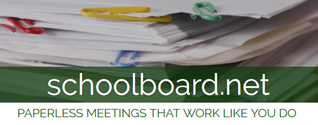2:140-E - Exhibit - Guidance for Board Member Communications, Including Email Use
Primary tabs
2:140-E - Exhibit - Guidance for Board Member Communications, Including Email Use
The School Board is authorized to discuss District business only at a properly noticed Board meeting (Open Meetings Act, 5 ILCS 120/). Other than during a Board meeting, a majority or more of a Board quorum may not engage in contemporaneous interactive communication, whether in person or electronically, to discuss District business. This Guidance assumes a Board has seven members and covers issues arising from Board policy 2:140, Communications To and From the Board.
Communications Outside of a Properly Noticed Board Meeting
- The Superintendent or designee is permitted to email information to Board members. For example, the Superintendent may email Board meeting agendas and supporting information to Board members. When responding to a single Board member’s request, the Superintendent should copy all other Board members and include a do not reply/forward alert to the group, such as: “BOARD MEMBER ALERT: This email is in response to a request. Do not reply or forward to the group but only to the sender.”
- Board members are permitted to discuss any matter except District business with each other, whether in person or by telephone or email, regardless of the number of members participating in the discussion. For example, they may discuss league sports, work, or current events.
- Board members are permitted to provide information to each other, whether in person or by telephone or email, that is non-deliberative and non-substantive. Examples of this type of communication include scheduling meetings and confirming receipt of information.
- A Board member is not permitted to discuss District business with more than one other Board member at a time, whether in person or by telephone or email. Stated another way, a Board member may discuss District business in person or by telephone or email with only one other Board member at a time. However, a Board member should not facilitate interactive communication by discussing District business in a series of visits with, or telephone calls or emails to, Board members individually.
- A Board member should include a do not reply/forward alert when emailing a message concerning District business to more than one other Board member. The following is an example of such an alert: “BOARD MEMBER ALERT: This email is not for interactive discussion purposes. The recipient should not reply to it or forward it to any other individual.”
- Board members should not forward email received from another Board member.
When Must Email Be Retained?
According to the Freedom of Information Act, a public record is any recorded information, regardless of physical form, “having been prepared by or for, or having been or being used by, received by, in the possession of, or under the control of any public body,” (5 ILCS 140/2). Email sent or received by Board members may be, depending on the content, subject to disclosure as a public record. Accordingly, Board members must be able to distinguish between official record and non-record messages. Important: According to the binding Ill. Public Access Opinion No. 11-6, electronic communications concerning the transaction of public business are public records subject to disclosure under FOIA even if they were sent from or received by an electronic device owned by a member of a public body, rather than the public body itself.
Non-Record Messages
Email messages are non-record messages when individual Board members are acting in their individual or personal capacities. Examples of non-record messages include:
- Personal correspondence, such as, “Do you want to ride with me to the IASB workshop?”
- Publications or promotional material from vendors or IASB.
- Political messages or ones containing campaign strategy.
- Messages mentioning public business in passing or in a nonsubstantive way.
- Personal correspondence concerning community activities or children.
Non-record messages are not public records under the Freedom of Information Act and do not need to be stored.
Official Record Messages
Email that qualifies under FOIA as a public record will need to be stored only if it is evidence of the District’s organization, function, policies, procedures, or activities or contains informational data appropriate for preservation (Local Records Act, 50 ILCS 205/). An example is any email from a Board officer concerning a decision made in his or her capacity as an officer. If a Board member uses his or her personal email, he or she must copy this type of email, herein called official record messages, to the appropriate District office where it will be stored on the Board member’s behalf. If made available, Board members should use their email accounts provided by the District and the District will automatically store the official record messages. The District will delete these official record messages as provided in an applicable, approved retention schedule.
Important: Do not destroy any email concerning a topic that is being litigated without obtaining the Board attorney’s direction. In federal lawsuits there is an automatic discovery of virtually all types of electronically created or stored data that might be relevant. Attorneys will generally notify their clients at the beginning of a legal proceeding not to destroy any electronic records that might be relevant. For more discussion of a litigation hold, see 2:250-AP2, Protocols for Record Preservation and Development of Retention Schedules.
DATED: September 30, 2013
